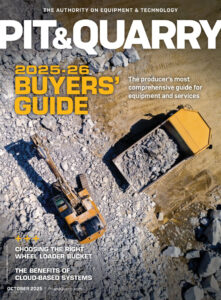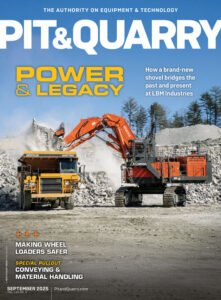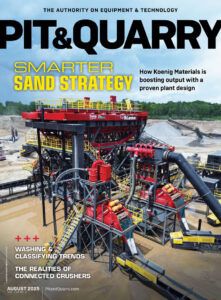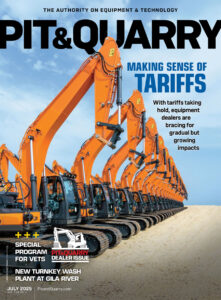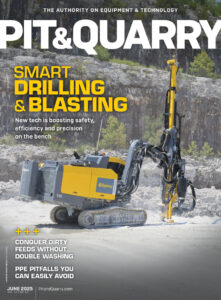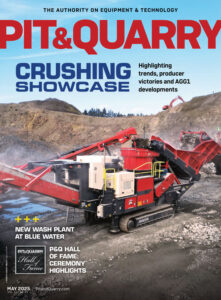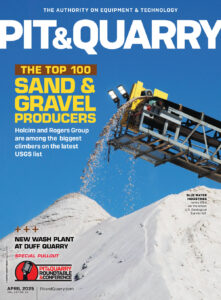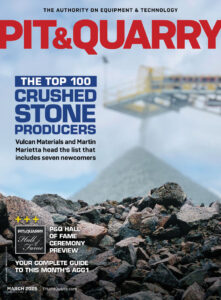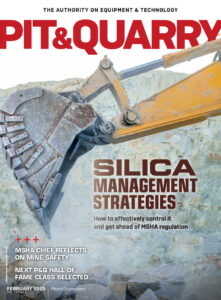Author
Increase in diversity at Vulcan Materials
Construction and aggregates-related jobs traditionally appeal to men, but Vulcan Materials Co. has seen an uptick in the number of women in its workforce. Darren Hicks, Vulcan’s vice president of human resources, told the Birmingham Business Journal that the company has seen an increase in the number of women in production positions throughout the company. “We have seen an increase in the number of women in production positions throughout the company,” he told the Birmingham Business Journal. “We expect this trend to continue.” According to Vulcan, 75 percent of its recruiting team is female, which attracts more females to jobs at the company. Hicks says the company’s mentoring program and the Vulcan Women’s Network also help retain female employees. Tessa Hughes, Vulcan’s senior attorney of employment and compliance, has been with the company for about 13 years. She has noticed the growth in diversity at the company. “In accepting the position at Vulcan, I was not concerned with the perception that the construction materials industry has been historically ‘male dominated,’”… Keep Reading
Brick & mortar: P&Q’s partnership
Pit & Quarry partners with the National Mining Hall of Fame & Museum in Colorado to create a national aggregates exhibit. The National Mining Hall of Fame & Museum in Leadville, Colo., gives guests the opportunity to dig through mining culture and history. In one room, a walkthrough hard rock mine exhibit makes guests feel like they are visiting an underground operation, featuring the sights and sounds of a hard rock mine. In another room, guests can get the feel for what prospecting was like decades ago in Colorado. There’s even an exhibit NASA contributed that showcases what the future of mining could be like on other planetary bodies. The museum features an exhibit on just about every aspect of mining. Possibly the only aspect missing from the museum to date: aggregates. Yet that will soon change. The National Mining Hall of Fame & Museum (NMHFM) partnered with Pit & Quarry to incorporate Pit & Quarry Hall of Fame inductees and a related exhibit dedicated to aggregates. “When [Pit & Quarry… Keep Reading
A better-trained workforce
A number of aggregate producers, manufacturers and allied trade representatives say a shortage of heavy equipment operators is plighting the aggregates and mining industries. Despite the shortage, more students have been graduating from mining schools with mining or engineering degrees, according to the Society for Mining, Metallurgy and Exploration (SME). Not only are people graduating with more knowledge on the industry, some are developing unique equipment experiences. Both Caterpillar and John Deere shared with Pit & Quarry how they have been supplying simulation technology to technical schools, universities and the military to train people interested in aggregates, mining and construction how to operate equipment before entering the field. This has been an ongoing innovation with both companies for a few years. “Students can try the equipment safely with no danger of getting anyone hurt, and [they] can’t damage the equipment,” says Les Whaley, Simformotion account manager for Caterpillar. “There’s also fuel savings to training this way since there’s no idle time, it’s accessible to students 24/7 and it doesn’t matter what the weather’s like. We try to… Keep Reading
Hinkle Contracting appoints president, CEO
Hinkle Contracting Co. promoted Larry Winkleman to be its president and CEO. Winkleman succeeds Tom Hinkle as the company’s president and CEO. Hinkle will continue his involvement with the company as a consultant and adviser to the management team on special projects. Winkleman joined Hinkle Contracting in August 2013 as its COO. He previously worked for three Ohio construction and construction materials businesses, including S.E. Johnson Cos. Inc., Kokosing Construction Cos. and Miller Bros Construction. Hinkle Contracting, based in Paris, Ky., operates 16 limestone quarries in Kentucky, Tennessee and Virginia, and 14 hot-mix asphalt plants in Kentucky. Keep Reading
Reclamation plan to turn quarry into giant water reservoir
The Bellwood Quarry, a 100-year-old granite quarry in Atlanta, has generated a lot of talk in Georgia lately. The quarry will soon undergo construction to be converted into one of the nation’s largest urban water storage reservoirs and a park. According to the Atlanta Journal-Constitution (AJC), Vulcan Materials Co. sold the Bellwood Quarry property to the city of Atlanta for $40 million in 2006, as the quarry finished operations. Aside from trespassers and several TV and movie crews, the quarry has remained almost untouched the last decade. Turning the Bellwood Quarry into a water storage reservoir will cost Atlanta an estimated $270 million, the AJC reports, but the city thinks it will be worth the expense. Currently, Atlanta only has a three-day backup water supply in case of drought or emergency. Jo Ann Macrina, Atlanta’s Department of Watershed Management commissioner, told the AJC that the reservoir would provide Atlanta a 30-day raw water supply, which could be extended to 60 or 90 days if water is used conservatively. Pumping stations… Keep Reading
Ivory crush event puts international spotlight on crushing
A portable crusher made international headlines in international news last week, as Powerscreen teamed with the U.S. Fish and Wildlife Service to crush 1 ton of illegally poached ivory on June 19 in New York's Times Square. Crowds gathered that morning to watch as a Powerscreen Trakpactor 260 reduced confiscated ivory products down to rubble. According to several news reports, the Obama Administration’s push to end poaching and wildlife trafficking rings prompted the U.S. Fish and Wildlife Service and the Wildlife Conservation Society to host the event. Although the event promoted anti-poaching, it also thrust crushing into the international spotlight. It’s doubtful people in the crowd had ever seen or heard crushers in action before, so the event promoted the crushing industry in that respect. Ivory crushes are trending, as well. This was not the first ivory crush to feature a Powerscreen crusher. Powerscreen teamed with the U.S. Fish and Wildlife Service in November 2013 for a similar event at the Rocky Mountain Arsenal National Wildlife Refuge near Denver to… Keep Reading
Best practices: Washing & classifying
Industry expert John Bennington discusses washing and classifying techniques with Pit & Quarry. John Bennington, product manager at Superior Industries, led an educational session on the basics and misconceptions of washing and classifying at the 2015 AGG1 Aggregates Academy & Expo. Bennington has been dealing with washing and classifying equipment since 1993. In the past, he has worked for Eagle Iron Works, GreyStone Inc. and Metso. Superior Industries hired him last spring to be its product manager of washing and classifying. Pit & Quarry connected with Bennington to discuss the topic further. P&Q: What are some common washing mistakes aggregate producers make? Bennington: Washing equipment, for the most part, is pretty reliable. It does its job day in and day out. When mistakes happen, it’s usually because operators haven’t paid enough attention to them after months or years at a time. The two biggest mistakes I see operators make are either they don’t pay attention to maintenance of equipment, or they don’t notice how changes in certain parts and products… Keep Reading
Working class traditions
One family contributes four generations of workers to the Bluegrass Materials Texas Quarry in Maryland. About half a dozen companies have owned the Texas Quarry in Cockeysville, Md., over the past 50 years, yet one name stayed consistent during that time: Greene. From great grandfather to grandfather to father to son, the Greene family provided members of the family with work in various positions at the quarry. While none of the Greenes held corporate positions, all men worked behind the scenes as truck drivers, crusher operators, product purchasers and mechanics. The Greenes say they often hear stories of fathers and sons who worked together at the same quarry, but, to date, they have not met someone who can match them in having four generations work at the same quarry. Ervin Greene says people at the Texas Quarry recognized the Greenes as “good, steady, loyal workers.” Both Ervin and his son, Ron, agree that the Texas Quarry took care of the family over the years. “They were happy with us, and… Keep Reading
Survey reports number of deficient rural roads
TRIP, a national nonprofit transportation research group, released a report titled “Rural Connections: Challenges and Opportunities in America’s Heartland” that cites any deficiencies or safety issues with rural roads and bridges in the United States. According to the report, rural roads and bridges in the U.S. have significant deficiencies. The chart pictured (click chart to enlarge) shows states with the highest rate of rural pavements in poor condition, states with the highest share of structurally deficient rural bridges and states with the highest fatality rates on rural roads. In 2013, 15 percent of the nation’s major rural roads were rated in poor condition and another 39 percent were rated in mediocre or fair condition. In 2014, 11 percent of the nation’s rural bridges were rated as structurally deficient and 10 percent were functionally obsolete. Additionally, TRIP reports rural traffic fatality rates remained high, while there was a substantial decrease in overall traffic fatalities. In 2013, non-Interstate rural roads had a traffic fatality rate of about two deaths for every 100… Keep Reading


